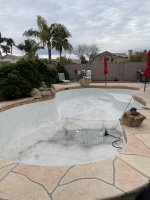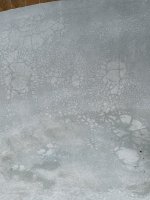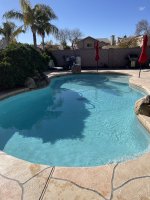A lot of plaster pools have “hollow spots” when you drain them and that “egg shell” cracking you see is superficial, not structural. When plaster is applied to the gunite shell it’s done under pressure and the troweled smooth. There is never perfect uniform bonding of the plaster to the gunite. But that’s ok because the water pressure force is what holds the plaster in place. You were lucky this time, don’t do it again.
Also, that estimate you got sounds low ball - cheapest white/grey plaster possible with no chip out of the old plaster. When it comes time to remodel YOU ABSOLUTELY WANT A FULL CHIP OUT (hope that’s clear

). Skim coating new plaster onto old plaster is cheap and reduces costs for the applicator and will result in a poor finish long term. If you were flipping the house, you’d be justified in skim coating (like tell the house painter to water down the paint and only spray on 2 coats, no rollback). If you plan to live in this house long term and care about the pool, then you want a full chip out. That will add to the cost of any quote on the order of several thousand dollars as it is all labor and hauling costs.





